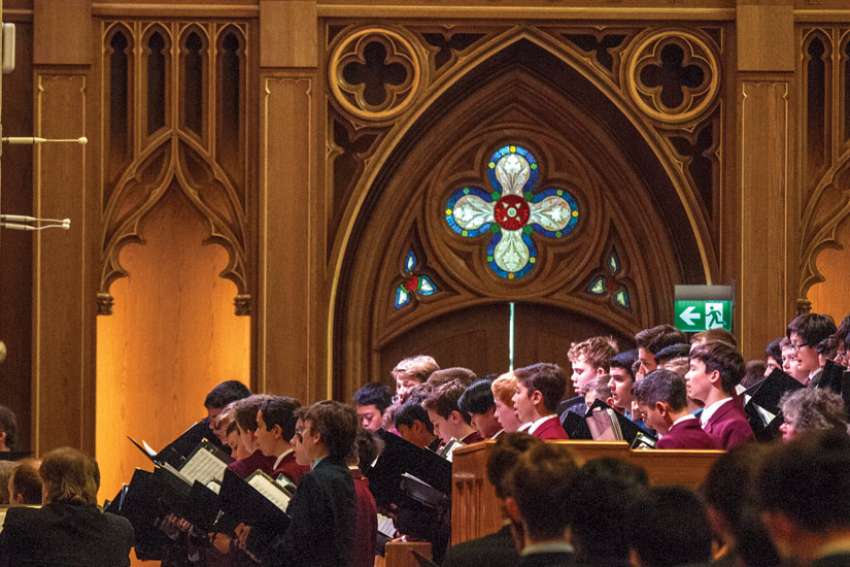The answer, as is usually the case in matters Catholic, not either/or but both/and. The point was made recently by Archbishop Georg Gänswein, who serves a dual role as prefect of the papal household for Pope Francis, as well as private secretary for Pope Emeritus Benedict XVI, in whose household he has lived since 2005. He was speaking at the launch of a new CD of sacred music recorded in the Sistine Chapel by its own choir.
“So the purpose of (the recording), which is a cultural undertaking, (also contributes to) the essence of the mission of the Catholic Church, which is to evangelize, to announce the Good News,” Archbishop Gänswein said. “All of this seeks to express that Church which goes out, of which Pope Francis speaks to us, a Church that isn’t afraid to speak the language of man and of his needs, of which music is a high and universal expression.”
As part of the festivities marking the rededication of St. Michael’s Cathedral, I was blessed to attend a concert of sacred music by the St. Michael’s Choir School. The boy choristers were magnificent and, I am told by those more musically knowledgeable than myself, sounded better than in previous years due to the enhanced acoustics of the new cathedral. It was not a concert that happened to take place in a church; it was sacred music in its proper home, performed for the dual purpose of exhibiting human excellence and the praise of God, from whom all blessings — including the gift of music — flow.
At one point, the younger boys were singing “Bless This House” and the lady sitting beside me leaned over to whisper, “It sounds like a prayer!”
“That’s because it is,” I replied. Indeed, it is quite a robust prayer, speaking in a childlike, but not childish, way about the dangers of sin and our need of salvation. It was a reminder that hymns and chants often speak in more direct language about the most important things than we are inclined to do even in preaching.
A recent book by Catholic author Robert Reilly, Surprised by Beauty (Ignatius Press), tells the hopeful story of a resurgence of beautiful music, both secular and sacred, composed by our contemporaries. The cathedral concert was evidence of that, as many of the compositions and arrangements were from the last hundred years, several of them by Canadians. Reilly’s book, by the way, is all the more useful today when it is so easy to get access to music electronically for a fraction of what it used to cost.
Music as missionary activity: There were many at the St. Michael’s concert who do not often come to the house of the Lord, or think about the things of God. Music drew them with its beauty, and instructed them in the lyrics.
That instruction is needed, even for those in the household of faith. Angela Kennedy, chair of trustees for the Toronto Catholic District School Board, gave a well-meaning address in which she praised the choir boys for their great talent and expressed the wish that “someone tell you that every day.” The teachers at the choir school and the priests of the cathedral likely tell the boys something different each day, namely that their marvellous talents — of which they are more than aware — are a gift from God intended for His praise and the service of others. Musical gifts are for God’s glory, not our vainglory.
On the topic of music, beauty and an encounter with the divine, Archbishop Gänswein would certainly object to a column that quoted him and not the man he serves, Benedict XVI. In a time of public communication that is harsh and colloquial, the beauty of Benedict’s prose stands out, no doubt nourished by the Mozart he likes to play on the piano. And so a final word to Benedict XVI, from a rare post-abdication address, in the summer of 2015.
“Music’s third place of origin is in the encounter with the divine which, from the beginning, is a part of that which defines the human reality,” Benedict said. “It is this encounter of man with the totally other and the totally great that elicits even more so new ways of expression. As a matter of fact, perhaps it could be said that even in the other two areas (of music’s origin) — love and death — the divine mystery touches us and, in that sense, it is the fact of being touched by God that constitutes the origin of music, all told.
“I find it moving to observe how in the Psalms, for example, singing alone does not suffice: appeal is made to all instruments. In this way the hidden music of all creation — its mysterious language — is aroused. With the Psalter, in which the motifs of death and love are also operative, we find ourselves right at the origin of the sacred music of the Church of God. One can say that the quality of music depends upon the purity and the greatness of the encounter with the divine, with the experience of love and of pain. The purer and truer this experience is, the purer and greater also will be the music that is born and develops from it.”
(Fr. de Souza is the editor-in-chief of Convivium, a Canadian magazine of faith in our common life: www.conviviummagazine.ca.)


